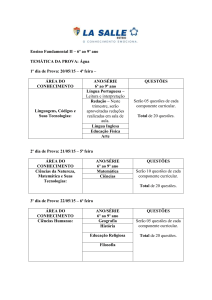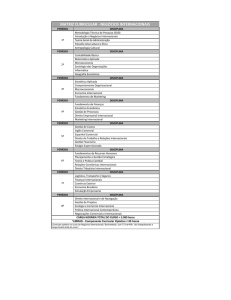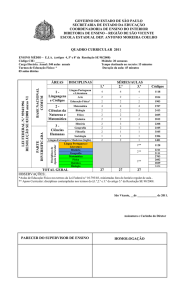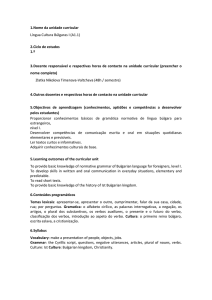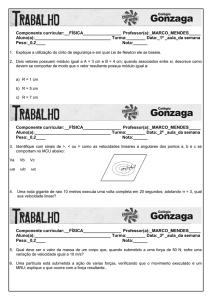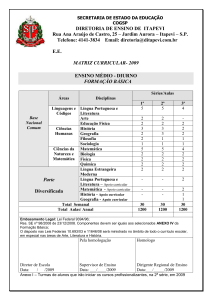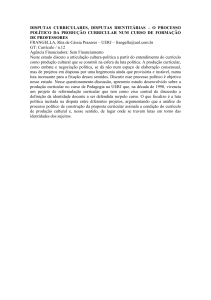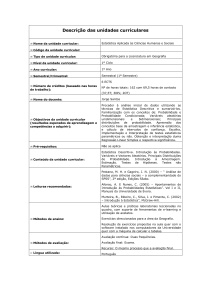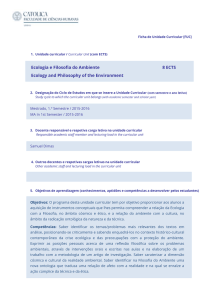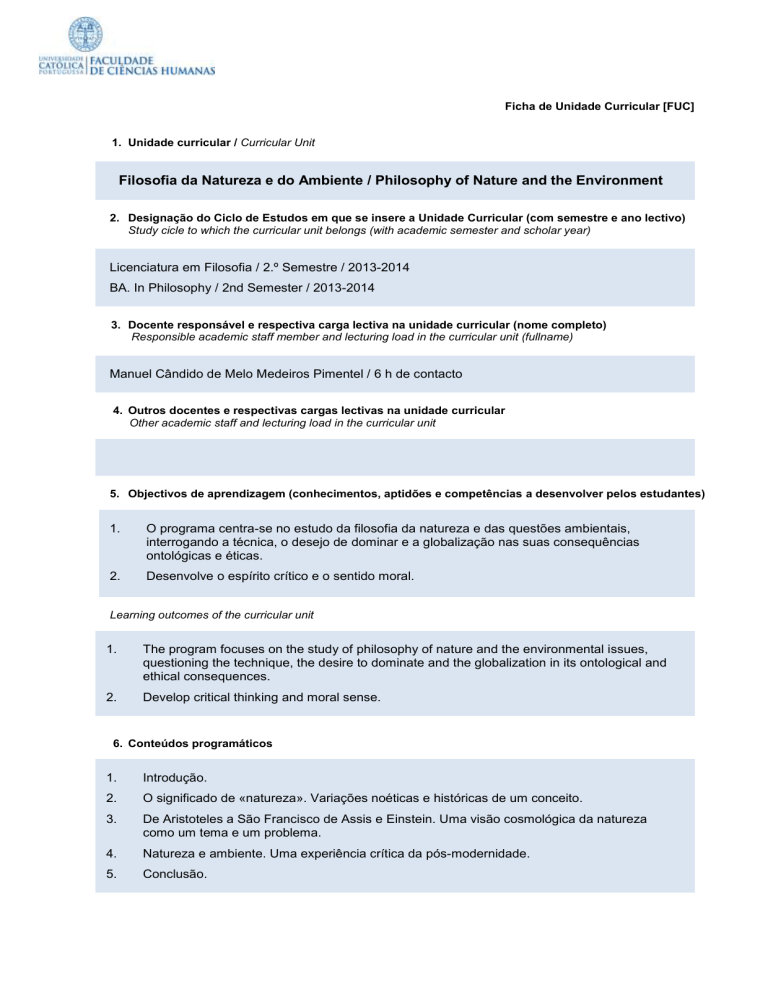
Ficha de Unidade Curricular [FUC]
1. Unidade curricular / Curricular Unit
Filosofia da Natureza e do Ambiente / Philosophy of Nature and the Environment
2. Designação do Ciclo de Estudos em que se insere a Unidade Curricular (com semestre e ano lectivo)
Study cicle to which the curricular unit belongs (with academic semester and scholar year)
Licenciatura em Filosofia / 2.º Semestre / 2013-2014
BA. In Philosophy / 2nd Semester / 2013-2014
3. Docente responsável e respectiva carga lectiva na unidade curricular (nome completo)
Responsible academic staff member and lecturing load in the curricular unit (fullname)
Manuel Cândido de Melo Medeiros Pimentel / 6 h de contacto
4. Outros docentes e respectivas cargas lectivas na unidade curricular
Other academic staff and lecturing load in the curricular unit
5. Objectivos de aprendizagem (conhecimentos, aptidões e competências a desenvolver pelos estudantes)
1.
O programa centra-se no estudo da filosofia da natureza e das questões ambientais,
interrogando a técnica, o desejo de dominar e a globalização nas suas consequências
ontológicas e éticas.
2.
Desenvolve o espírito crítico e o sentido moral.
Learning outcomes of the curricular unit
1.
The program focuses on the study of philosophy of nature and the environmental issues,
questioning the technique, the desire to dominate and the globalization in its ontological and
ethical consequences.
2.
Develop critical thinking and moral sense.
6. Conteúdos programáticos
1.
Introdução.
2.
O significado de «natureza». Variações noéticas e históricas de um conceito.
3.
De Aristoteles a São Francisco de Assis e Einstein. Uma visão cosmológica da natureza
como um tema e um problema.
4.
Natureza e ambiente. Uma experiência crítica da pós-modernidade.
5.
Conclusão.
Syllabus
1.
Introduction.
2.
The meaning of 'nature'. Noetic and historical variations of a concept.
3.
From Aristotle to St. Francis of Assisi and Einstein. A cosmological vision of nature as a
theme and a problem.
4.
Nature and environment. A critical experience of postmodernity.
5.
Conclusion.
7. Demonstração da coerência dos conteúdos programáticos com os objectivos da unidade curricular
Os conteúdos programáticos da unidade curricular «Filosofia da Natureza e do Ambiente» foram
definidos em função dos objetivos e das competências a adquirir pelos estudantes. Existe uma
articulação dos conteúdos programáticos em ordem ao conhecimento das questões
fundamentais – ontológicas, éticas, culturais e civilizacionais - sobre o ambiente. Feito este
percurso, o estudante estará apto para compreender e refletir sobre temas e problemas
ambientais.
Demonstration of the coherence between the syllabus and the curricular unit's objectives
The syllabus of the curricular unit «Philosophy of Nature and the Environment» was defined
according to the objectives and competences to be acquired by the students. There is an
articulation of the syllabus in order to knowledge of the fundamental questions about the
environment. This way, the student will be able to understand and reflect on issues and
environmental problems.
8. Metodologia de ensino (avaliação incluída)
Ensino: B-learning. Metodologia de Avaliação Contínua.
Avaliação: São elementos obrigatórios de avaliação: 1) Uma prova escrita de avaliação de
conhecimentos [50% da avaliação]. 2) Um relatório temático [20% da avaliação], 3) Um trabalho
sobre um autor, um tema e um texto, escolhidos a partir do programa [30% da avaliação].
Teaching methodologies (including evaluation)
Teaching: B-learning. Continuous assessment methodology.
Evaluation: The following factors of evaluation are compulsory: 1) One written test to evaluate
the knowledge acquired [50% of the evaluation]. 2) A thematic report [20% of the evaluation]. 3)
One written essay on an author, a theme and a text, selected from the program’s contents [30%
of evaluation].
9. Demonstração da coerência das metodologias de ensino com os objectivos de aprendizagem da
unidade curricular
A unidade curricular «Filosofia da Natureza e do Ambiente» privilegia a avaliação contínua. A
metodologia de ensino centra-se no estudante e permite que este desenvolva um trabalho ao
longo do semestre, de uma forma graduada e proporcional, de modo a demonstrar as
competências adquiridas. Os elementos obrigatórios de avaliação garantem o progresso
qualitativo e quantitativo da aprendizagem.
Demonstration of the coherence between the teaching methodologies and the curricular unit's objectives
The unit «Philosophy of Nature and the Environment» focuses on continuous assessment
methodology. The teaching methodology is student-centered and allows the student to develop a
work throughout the semester, in a gradual and proportionate way, to demonstrate the
competences acquired. The mandatory elements of the assessment (written test, thematic report,
monographic work) are important to ensure the qualitative and quantitative assessment of
learning.
8. Bibliografia principal
Main bibliography
ANGELINI, Giuseppe, Ambiente e tradizione cristiana, Brescia, Morcelliana, 1990;
ARISTÓTELES, La Physique, Paris, Les Belles Lettres, 1931, 2 vols;
COIMBRA, Leonardo, Obras completas de Leonardo Coimbra, Lx, INCM, 2004-2013;
EINSTEIN, Albert, INFELD, Leopold, A evolução da física, Lx, Livros do Brasil,
1970;
GONÇALVES, J. Cerqueira, Em louvor da vida e da morte, Lx, Ed. Colibri, 1998;
HEIDEGGER, Martin, Ser e tempo, Editora Vozes, Petrópolis, 1998; Essais et conférences,
Paris, Gallimard, 1958;
JAMIESON, Dale (coord), Manual de Filosofia do Ambiente, Lx, Piaget, 2005;
KANT, Immanuel, Crítica da Faculdade de Julgar, Lx, IN-CM, 1998; Crítica da Razão Pura,
Lx, Gulbenkian, 1985;
L. DÓRIGA, Enrique, El universo de Newton y de Einstein, Barcelona, Herder, 1985;
PIMENTEL, M. Cândido, Odisseias do espírito, Lx, INCM, 1996; Razão comovida, Lx,
INCM, 2011;
WHITEHEAD, A. North, The Concept of Nature, Cambridge, University Press, 1990;
Processo e Realidade, Lx, CFUL, 2010.

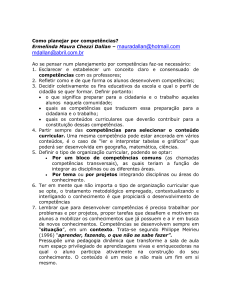
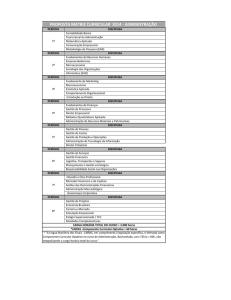
![Seminário [História Antiga]](http://s1.studylibpt.com/store/data/001254899_1-5f51363e7ff1a9132562b4d14bd1112c-300x300.png)
